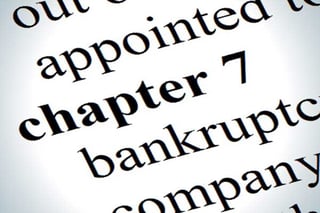 There are numerous online inquiries for what is a Chapter 7 Liquidation anyway? There are many misconceptions about bankruptcy and Chapter 7 Bankruptcy and what it is and what it does and does not do. So, how about we discuss a Chapter 7 Liquidation in terms that we can understand uh? Great, here we go!
There are numerous online inquiries for what is a Chapter 7 Liquidation anyway? There are many misconceptions about bankruptcy and Chapter 7 Bankruptcy and what it is and what it does and does not do. So, how about we discuss a Chapter 7 Liquidation in terms that we can understand uh? Great, here we go!
PRIMARY PURPOSE
One of the primary purposes of bankruptcy is to create order out of chaos. When a person is struggling to pay their bills on time here is what we don’t want to have happen: we don’t want creditors, who know he debtor is struggling to pay their bills on time, race to take the debtor’s assets. This would result in very few creditors receiving all the debtor’s assets and the leaving the creditors who are not “in the know” without any recourse.
We also don’t want the debtor struggling to pay for basic necessities because creditors are taking all of the debtor’s assets- leaving the debtor to apply to the state and county for basic assistance. So, part of the function of a bankruptcy is to create order out of a chaotic situation.
AUTOMATIC STAY
Section 362 of the bankruptcy code is a huge safety net for debtors. The instant a chapter 7 bankruptcy case is filed with the bankruptcy court, Federal Bankruptcy Law, under Section 362 of the Bankruptcy Code prohibits any of the debtor’s creditors from taking action to collect a pre-petition debt from debtor once the case is filed.
I always tell my guests, that once the case is filed with the bankruptcy court, it’s like getting peace in the valley. Creditors, amongst other things, may not call the debtor, send bills to the debtor, sue the debtor, garnish or levy the debtor, do anything to attempt to collect on the pre-petition debt.
Creditors that violate the automatic stay provisions of the bankruptcy code risk a bankruptcy judge awarding debtor attorneys fees, punitive damages, and regular damages. The purpose of the automatic stay is to 1) prevent a run on debtor’s assets, and 2) protect debtor from their creditors, and 3) preserve the estate assets.
DISCLOSURE OF ASSETS AND DEBTS AND FINANCIAL AFFAIRS
Upon filing the Chapter 7 Bankruptcy petition with the bankruptcy court, debtors are required to make numerous disclosures to the bankruptcy court. Filing bankruptcy is the opposite of playing poker. When you play poker, you get to hide your cards from everyone else. You never “show your cards”. Bankruptcy is the exact opposite.
In bankruptcy, your financial life is an open book. You must disclose ALL your assets, ALL your creditors and answer many financial questions. The schedules must be accurate and complete!
CREATION OF A BANKRUPTCY ESTATE
Upon filing Chapter 7 Bankruptcy, a “bankruptcy estate” is created. In effect, once a “bankruptcy estate” is created all assets once owned by the debtor, get transferred to the “bankruptcy estate”. Under Bankruptcy Law, Section 541 of the Bankruptcy Code creates the estate.
Once the Chapter 7 Bankruptcy is filed with the court, all assets that were owned by debtor belong to the estate, for a period of time. You see, the bankruptcy code allows debtor to claim some or all of his/her assets as “exempt”.
DON’T PANIC- THERE ARE EXEMPTIONS!
Section 522 of the Bankruptcy Code allows debtor to use “exemptions” to protect debtor’s assets. While there are limits to these exemptions, most debtor’s are able to use these exemptions to protect all of their assets. There are exemptions for a home, vehicles, clothing, pensions, furnishings, and many other assets!
As we say so many times, the VAST majority of our guests lose no assets when they file Chapter 7 Bankruptcy. 30 days after the 341 meeting, if there are no objections to the claimed exemptions, the ownership of the assets “revert” back to debtor. Once the 30 day deadline passes, debtor is free to sell or do anything with his/her assets that they desire. If they sell assets prior to the 30 days expiring, they are selling estate assets and they can get into some trouble for doing so.
It’s always best to check with your bankruptcy lawyer before you sell any assets before or after bankruptcy.
WHAT HAPPENS TO ASSETS YOU CAN’T EXEMPT?: LIQUIDATION
Whatever assets debtor did not exempt and to which a trustee has not objected to the exemption, remain in the estate and must be “liquidated” by the chapter 7 trustee. What does liquidation mean? Reduced to money essentially. That means the remaining non-exempt assets must be sold and reduced to money, and that money is then used to distribute to creditors pro rata by the trustee.
For example, say a debtor owned a condo in Florida with 30k in equity in it. Debtor listed the condo on her schedules but could not claim an exemption on the property. So, trustee proceeds to sell the condo and receive money. If debtor had 100k in credit card debt and trustee received 30k net proceeds from the sale of the condo, creditors would receive a pro rata (according to the size of the debt) distribution of 30k.
The net result is debtor would discharge 70k in debt, forever, tax free! Not a bad deal! So, while “liquidation” sounds scary, the trustee does not liquidate all your assets. Most debtors have zero non exempt assets and so the bankruptcy estate is closed without any distribution to creditors at all. What debtors are allowed to claim as exempt is broad and usually covers all debtors assets. However, there are limits to these exemptions.
The more accurate way to describe “liquidation” is to say the trustee will liquidate whatever assets not claimed as exempt by debtor and to which trustee did not object to the claimed exemption (and if they did lodge and objection a judge sustained the exemption)
CONCLUSION
The above discussion are the basics of Chapter 7 Liquidation. The bankruptcy code is vast and it takes a skilled and experienced bankruptcy attorney to make sure assets can be claimed exempt. When they can’t be claimed as exempt is takes a skilled bankruptcy lawyer to negotiate with the trustee to retain these assets for debtor if debtor so chooses to purchase the non exempt assets from the estate.
When the time is right or when you are ready reach out to Minnesota’s 24/7 Bankruptcy Help Line at www.kainscott.com.



